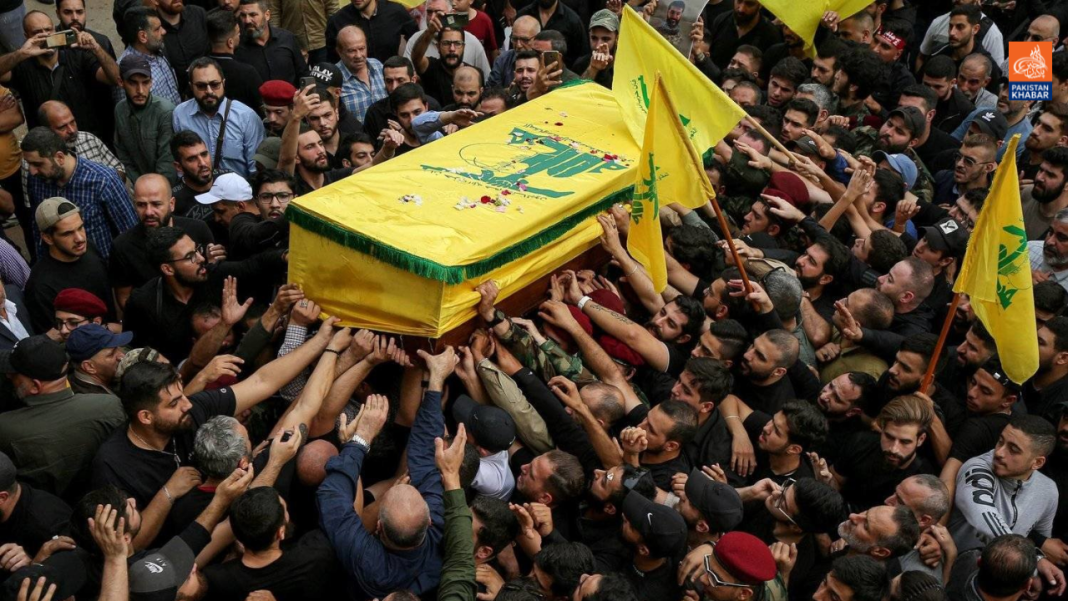A second wave of unprecedented and deadly explosions in Hezbollah’s strongholds left the group in disarray on Thursday, just hours before a significant speech by its embattled leader, Hassan Nasrallah.
According to officials, the latest series of blasts on Wednesday claimed 20 lives and injured over 450 people, sparking concerns of a possible all-out war with Israel.
The explosions followed a previous attack the day before, where the simultaneous detonation of pagers used by Hezbollah killed 12 people, including two children, and injured nearly 2,800 others across Lebanon. The attack, blamed on Israel, marked an unprecedented escalation.
Walkie-talkies used by Hezbollah members detonated in the latest explosions at their Beirut stronghold, a source close to the group revealed. State media also reported similar blasts in southern and eastern Lebanon.
AFPTV footage captured people running for cover as an explosion occurred during the funeral of Hezbollah fighters in southern Beirut.
“The wave of enemy explosions targeting walkie-talkies killed 20 and wounded more than 450,” Lebanon’s health ministry stated.
Israel did not comment on the explosions, but just hours before Tuesday’s blasts, it had announced an expansion of its offensive in Gaza to include targeting Hezbollah, a Hamas ally.
“The center of gravity is shifting north,” Israeli Defense Minister Yoav Gallant said during a visit to an airbase on Wednesday, adding, “We are entering a new phase in the war.”
Amos Harel, a columnist for Haaretz, suggested the attacks on pagers and walkie-talkies had brought “Israel and Hezbollah to the brink of total war.”
Global Diplomatic Response
As tensions in the Middle East escalated, senior diplomats from the United States, Britain, Germany, France, and Italy are set to meet in Paris on Thursday, ahead of a UN Security Council meeting scheduled for Friday.
US Secretary of State Antony Blinken will join the discussions in Paris after talking about a potential Gaza truce in Cairo. Meanwhile, the White House urged restraint, with National Security Council spokesman John Kirby stating, “We don’t believe further military operations will solve the current crisis.”
Hezbollah has been engaged in near-daily cross-border exchanges with Israel since Hamas launched its attacks on October 7, igniting the conflict in Gaza.
Lebanese Foreign Minister Abdallah Bou Habib condemned the explosions as a “blatant violation of Lebanon’s sovereignty,” warning that it could lead to a wider war.
Hezbollah blamed Israel for the attack, calling it a “criminal aggression” and vowed to retaliate. Iran’s envoy to the UN echoed this, stating that Iran reserves the right to take “retaliatory measures” after its ambassador in Beirut was injured.
The influx of casualties overwhelmed hospitals. In Beirut, Dr. Joelle Khadra described the injuries as mostly affecting the eyes and hands, with many patients suffering amputations and shrapnel wounds, some losing their sight.
Among the dead was the 10-year-old daughter of a Hezbollah member, killed when her father’s pager exploded in Lebanon’s Bekaa Valley.
Analysts Weigh In
Experts suggested the pagers had been tampered with before reaching Hezbollah. Charles Lister from the Middle East Institute said, “A small plastic explosive was likely hidden alongside the battery, designed to detonate via a call or page.”
A Lebanese security official confirmed that early investigations pointed to the pagers being booby-trapped, containing explosives planted near the battery.
The New York Times reported that the pagers had been sourced from Taiwanese manufacturer Gold Apollo, though the company clarified they were produced by its Hungarian partner BAC Consulting KFT. Hungarian officials stated the company only acted as a trading intermediary.
This attack significantly impacted Hezbollah, which has already faced concerns over the security of its communications, especially after several commanders were lost in targeted strikes in recent months.
As regional fears of further escalation grew, airlines such as Lufthansa and Air France suspended flights to Tel Aviv, Tehran, and Beirut until Thursday.
Rising Tensions
Since October, exchanges of fire between Israeli forces and Hezbollah have led to hundreds of deaths, mostly of fighters in Lebanon and soldiers in Israel, while forcing tens of thousands to flee their homes.
UN rights chief Volker Turk described the recent attack as “shocking” and warned against its “unacceptable” impact on civilians. UN Secretary-General Antonio Guterres urged governments not to use civilian objects as weapons.
The conflict that began on October 7 has already claimed the lives of 1,205 people in Israel, mostly civilians, according to an AFP tally. Out of the 251 hostages taken by Hamas, 97 remain captive, including 33 whom Israel believes have been killed.
In Gaza, Israel’s retaliatory strikes have resulted in the deaths of at least 41,272 people, mostly civilians, as per the territory’s health ministry. The UN has acknowledged these figures as credible.
On Wednesday, the civil defense agency in Gaza reported that an Israeli airstrike on a school-turned-shelter killed five people, while the Israeli military stated it was targeting Hamas.




